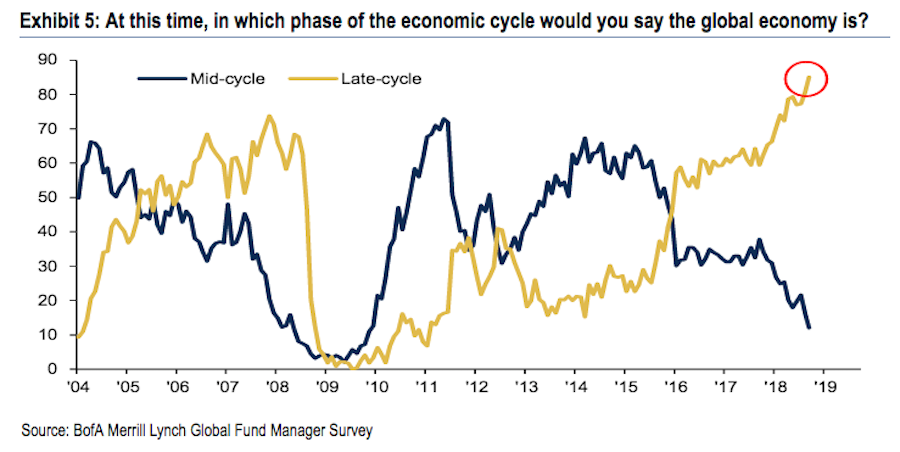Investors haven't been this bearish on the economy since 2008
Investors think the global economic expansion is near its end.
According to Bank of America Merrill Lynch’s latest global fund manager survey, 38% of investors think that global economic growth will decelerate in the next 12 months, the highest percentage since November 2008.
By November 2008, the global economy was already on a downswing as the impacts of the global financial crisis were spreading across the world economy.

BAML’s report also showed that a record 85% of fund managers think the global economy is in late cycle. This reading is 11% above the reading’s prior highs back in December 2007, just ahead of the recession that accompanied the global financial crisis.
Since the beginning of 2016, more than half of investors polled have indicated to BAML that they believe the global economy is in its final phases. The proportion of investors seeing the economy in a late cycle phase has sharply increased since late last year. Bank of America’s survey polled 174 fund managers with a collective $518 billion in assets under management.

Positioning among investors also remains cautious, with investors currently more overweight cash holdings relative to typical levels than any other asset in their portfolios right now.
Earlier this month, the International Monetary Fund cut its outlook for global economic growth for the first time in two years, saying it now expects the global economy to grow 3.7% in 2018 and 2019. Back in July, the IMF said it saw the economy growing 3.9%.
In the first half of this year, the U.S. economy has seen some of its best economic growth in years with GDP growing at an annualized pace of 4.2% in the second quarter of the year, the fastest since 2014. Wall Street economists expect third quarter growth to clock in at a pace of 3.2%.
Investors anticipating slowing economic growth is a theme that some strategists said was driving the market action during last week’s volatile trading in the stock market when the S&P 500 declined more than 3% in a session for the third time this year. In 2016 and 2017 there were no days the benchmark index saw a drop of this magnitude.
Oliver Jones, markets economist at Capital Economics, said in a note to clients that week that the decline in the stock market, “suggests that investors are starting to factor in the prospect of the U.S. economy slowing in response to tighter monetary policy.”
“We think that a slowdown in the U.S. economy is no more than a few quarter away, and ultimately expect Treasury yields and the S&P 500 to end next year much lower,” Jones added. “While we are not anticipating anything as dramatic as the global financial crisis, we do think that economic growth will clearly have fallen significantly by mid-2019.”
Capital Economics expects the S&P 500 will drop 15% from its recent high.
—
Myles Udland is a writer at Yahoo Finance. Follow him on Twitter @MylesUdland
